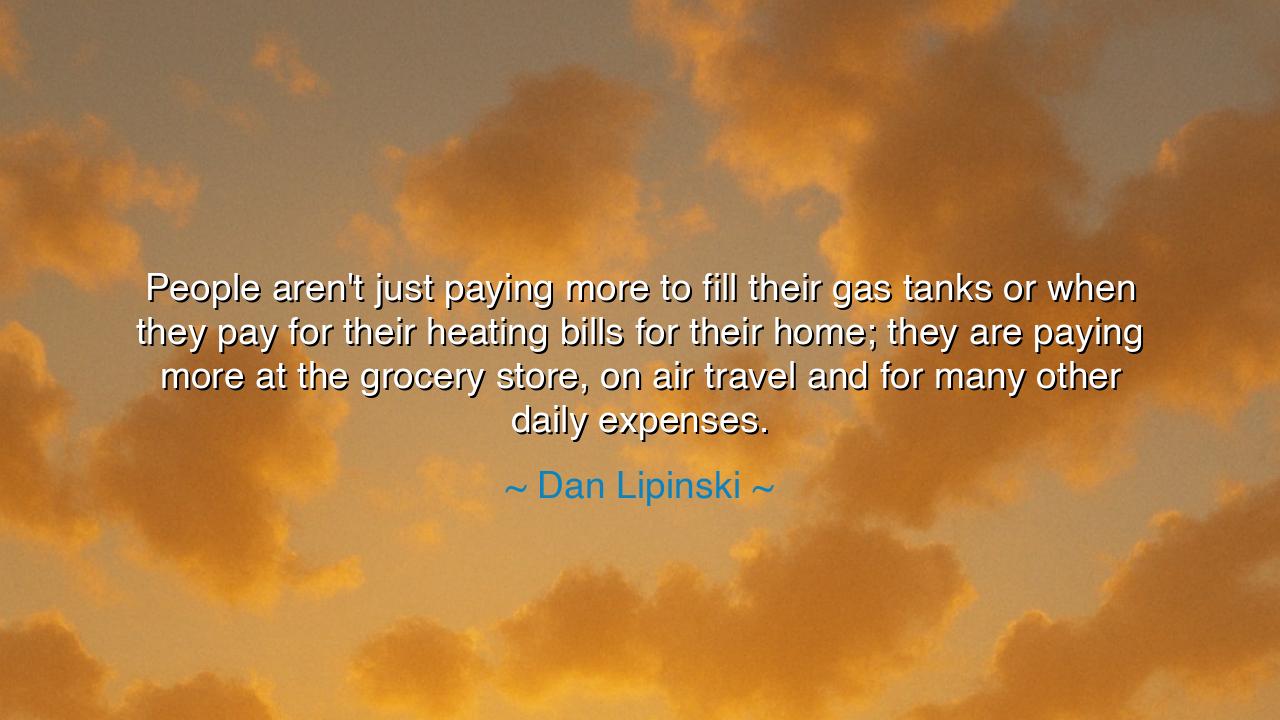
People aren't just paying more to fill their gas tanks or when
People aren't just paying more to fill their gas tanks or when they pay for their heating bills for their home; they are paying more at the grocery store, on air travel and for many other daily expenses.






Hear the words of Dan Lipinski, spoken in a time of strain and unrest: “People aren't just paying more to fill their gas tanks or when they pay for their heating bills for their home; they are paying more at the grocery store, on air travel and for many other daily expenses.” At first glance, this saying is a lament of rising costs, a tale of burdens laid upon the shoulders of the common man. But beneath the surface, it is more than complaint—it is a revelation of the eternal cycle of toil, of how the struggles of the many echo across generations, binding us together in our shared burden and our shared endurance.
The mention of gas tanks and heating bills is not mere detail; it is the cry of survival itself. For these are not luxuries but necessities—the fire to warm one’s dwelling, the fuel to carry one’s body to labor. When the weight of such things increases, it presses not upon the wealthy alone, but upon the multitudes, upon families striving to live in dignity. And when even the grocery store demands a greater tribute, the heart of the people trembles, for bread and milk, once humble in cost, become treasures too dearly bought. Thus the quote captures a universal truth: that the cost of life itself can rise, leaving men and women feeling as if the very world conspires against their survival.
Think back, O listener, to the days of the Roman Republic, when the cry of the plebeians rang through the streets: “Bread and justice!” The Senate, burdened with power, often forgot the hunger of the poor. Grain prices rose, and the common folk starved while the wealthy feasted. In time, leaders arose who gave grain to the people at lowered cost, understanding that when daily life becomes unbearable, a nation itself begins to fracture. Lipinski’s words echo this ancient truth: when the small expenses of life grow heavy, the people themselves cry out for balance and relief.
There is in this saying also a hidden heroism. For though the people are pressed by the rising toll of daily expenses, they endure. They do not cease to work, to strive, to raise their children, to keep their homes. This endurance is a quiet heroism, unseen by statues or trumpets, yet it is the strength upon which all nations rest. The man who pays more at the grocery store, the woman who sacrifices for her child’s heating bill, they are the pillars of civilization, standing firm though the storm of hardship beats upon them.
But let us not grow complacent. Hardship teaches, but it also warns. The lesson is not only endurance, but foresight. When the world presses more heavily, one must learn the arts of prudence and wisdom. In times of plenty, store up grain; in times of want, spend with care. Just as the wise ants gather in summer for the cold of winter, so must men and women prepare, learn thrift, and cherish that which is necessary above that which is fleeting.
And yet, beyond thrift, there is a call to solidarity. For no man walks alone in this trial. When burdens rise, communities must lift each other, neighbors must support neighbors, leaders must remember the cries of the common folk. In the old days, villages gathered together to share the harvest, so that none would perish. So too must modern people rediscover the ancient bond of fellowship.
Therefore, O seeker of wisdom, carry this teaching into your life: when expenses rise, do not surrender to despair, but sharpen your mind with prudence, strengthen your heart with endurance, and stretch forth your hand with compassion. The storm may batter the house, but the house that is built with wisdom, courage, and brotherhood shall not fall. Let the struggles of the moment be not only weights upon your back, but teachers that prepare you for a stronger tomorrow. For though the price of living may grow heavier, the value of unity and resilience is beyond measure.
Thus, let this truth be etched upon your soul: though men may pay more for their gas tanks, their heating bills, their groceries, and their daily needs, they need never pay with the loss of their dignity, their hope, or their will to endure.






AAdministratorAdministrator
Welcome, honored guests. Please leave a comment, we will respond soon